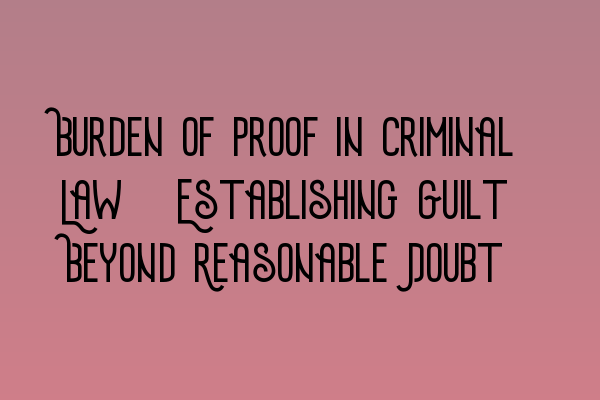Burden of Proof in Criminal Law: Establishing Guilt Beyond Reasonable Doubt
As criminal defense solicitors at SQE Criminal Law & Practice Law UK, we understand the significance of the burden of proof in criminal cases. The burden of proof lies with the prosecution, who must establish the guilt of the accused beyond a reasonable doubt. This high standard ensures that individuals are not wrongfully convicted and safeguards the fundamental principle of “innocent until proven guilty.”
In this blog post, we will delve deeper into the concept of the burden of proof, its importance in criminal law, and how it is established in practice. We will also discuss the challenges faced by both the prosecution and defense in meeting this burden.
The Burden of Proof: Understanding Beyond Reasonable Doubt
The burden of proof is the responsibility of the prosecution to present evidence that convinces the court or jury of the accused’s guilt beyond a reasonable doubt. This standard is the highest level of proof required in the legal system and serves as a safeguard against wrongful convictions. It ensures that no individual is convicted solely on the basis of suspicion or insufficient evidence.
The concept of “beyond reasonable doubt” is subjective to some extent, but it requires the prosecution to present evidence that is highly probable and eliminates any reasonable alternative explanations. This standard is intentionally challenging to meet, as it upholds the principle of fairness and protects individuals from unjust punishment.
Establishing the Burden of Proof: The Role of Evidence
In order to establish the burden of proof, the prosecution must present evidence that is both relevant and admissible in court. This evidence can include witness testimonies, expert opinions, physical evidence, and documentary proof. The strength of the evidence presented by the prosecution directly impacts their ability to meet the burden of proof.
However, meeting the burden of proof goes beyond simply presenting evidence. The prosecution must also effectively present their case, demonstrating a clear and coherent narrative that convincingly establishes the accused’s guilt. This requires careful organization of evidence and skillful courtroom presentation.
Challenges Faced by the Prosecution
The burden of proof places significant challenges on the prosecution. They must ensure that their evidence is reliable, credible, and persuasive. Any loopholes or inconsistencies in the evidence can weaken their case and create doubt in the minds of the judge or jury.
Additionally, the prosecution must be prepared to counter any strategies employed by the defense to create reasonable doubt. The defense may challenge the admissibility of evidence, question the credibility of witnesses, or present alternative explanations for the events in question. The prosecution must anticipate these challenges and have compelling responses to maintain the burden of proof.
Challenges Faced by the Defense
Despite the burden of proof resting on the prosecution, the defense also faces challenges in criminal cases. Their primary goal is to create a reasonable doubt in the minds of the judge or jury. This can be achieved by challenging the credibility of witnesses, pointing out inconsistencies in the evidence, or presenting alternative theories of the crime.
Strategic cross-examination and careful selection of defense witnesses are crucial tactics employed by the defense to undermine the prosecution’s case and weaken the burden of proof. The defense must also craft a compelling narrative that raises doubts about the accused’s guilt.
Conclusion: Upholding Justice Through the Burden of Proof
The burden of proof in criminal law serves as a foundation for ensuring justice and protecting the rights of individuals accused of crimes. By establishing guilt beyond a reasonable doubt, the legal system avoids wrongful convictions and safeguards the presumption of innocence.
At SQE Criminal Law & Practice Law UK, we recognize the importance of the burden of proof in criminal cases. Our solicitors are well-versed in navigating the complexities of criminal law and diligently strive to meet the burden of proof in every case we handle.
For further information on SQE exams, practice mock exams, and preparation courses, check out our SQE 1 Practice Exam Questions article, SQE 1 Practice Mocks FLK1 FLK2 article, SQE 2 Preparation Courses, and SQE 1 Preparation Courses. Stay updated with the latest SRA SQE Exam Dates to plan your preparation effectively.
